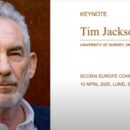
Fellowship | Towards a ‘Social Psychology’ of Sustainable Consumption
Consumer behaviour is key to the impact that society has on its environment. The actions that people take and the choices they make—to consume certain products and services or to live in certain ways rather than others—all have direct and indirect impacts on the environment, as well as on personal (and collective) well-being. This is why the topic of ‘sustainable consumption’ has become a central focus for national and international policy.
At the time when this research fellowship commenced in 2003, the terminology of sustainable consumption was relatively recent; it can be dated more or less to Agenda 21, the main policy document to emerge from the Rio Earth Summit in 1992. That document provided a potentially far-reaching mandate for examining and revising consumption patterns and—by implication—consumer behaviours, attitudes and lifestyles. A host of initiatives on sustainable consumption emerged during the 1990s, and by the time of the second Earth Summit in Johannesburg in 2002, changing consumption and production patterns had been identified as one of three ‘overarching objectives’ for sustainable development.
Despite this flurry of activity, agreement on what sustainable consumption is or should be about has proved remarkably difficult to negotiate. Some approaches have focused on the role of technological improvement and ‘getting the prices right’. Others imply a far more radical overhaul of the status quo in which sustainable consumption is about the ‘management of greed’ in affluent societies. Neither position is unequivocally useful: the former because it offers little new to existing policies on resource productivity and economic efficiency, the latter because it underestimates the complexity of human motivations and risks alienating those whose behaviour it seeks to change.
In spite of these difficulties, it is clear that consumption remains an important issue in sustainable development. In particular, there is a very real need to ensure that environmental gains are not offset by rebound effects, that entrenched behaviours do not render sustainable technologies redundant and that the continued expansion of consumer expectation and demand does not simply swamp the efficiency gains made through cleaner and more sustainable products. Whatever perspective we take on sustainable consumption we are drawn inevitably towards the need for a clearer understanding of consumer behaviour and human choice.
Why do we consume? What do we expect to gain from consumer goods? How successful are we in meeting those expectations? What constrains our choices? And what drives our expectations in the first place? All these questions become vitally important in deriving policies which could help us protect the environment and improve our quality of life.
Objectives
The overall aim of this fellowship was to explore the conceptual foundations for a view of human behaviour which is consistent with the goal of sustainable consumption and to examine the extent to which such a model could inform the development of a new policy agenda for sustainable consumption. Specific objectives were:
- to undertake a critical review of the recent and historical literature on consumption and consumer behaviour and to communicate that review in a variety of forms to both academic and policy audiences;
- to identify key resonances and dissonances between different conceptual models of behaviour within the literature and to examine the implications of these for sustainable consumption;
- to explore the potential to develop a new ‘social psychology’ of ecologically and socially responsible behaviour; and
- to examine the implications of this work for the project of developing a coherent policy framework for sustainable consumption.
By facilitating academic time away from teaching and administrative duties, the grant further allowed Tim the opportunity to work towards two major publication projects: a collected anthology and an extended monograph, both on sustainable consumption. A short policy-maker’s summary reporting the results of the work was also promised.
The project summary report is available for download in pdf.
Further reading
Jackson, T 2002. Quality of Life, Sustainability and Economic Growth. In: Cahill, M and A Fitzpatrick (Eds): Environment and Welfare: towards a green social policy, Palgrave Macmillan, London, 97-116.
Jackson, T 2005. Motivating Sustainable Consumption: a review of evidence on consumer behaviour and behavioural change. London: Policy Studies Institute.
Jackson, T (ed) 2006. Earthscan Reader in Sustainable Consumption. London: Earthscan.
SDC, NCC 2006. I will if you will — Towards sustainable consumption. A Summary. Sustainable Consumption Roundtable.
Jackson, T 2006. Consuming paradise? Towards a social and cultural psychology of sustainable consumption. In: Jackson, T (Ed): The Earthscan Reader in Sustainable Consumption. London: Earthscan.
Jackson, T 2013. Angst essen Seele auf – Escaping the ‘iron cage’ of consumerism. In: Wuppertal Spezial (Vol 48), Wuppertal Institute for Climate, Environment and Energy.
Jackson, T 2013. The Altruist Within. In: Sofia #109, pp. 4 – 9.
Armstrong, A and T Jackson 2015. The Mindful Consumer. Mindfulness training and the escape from consumerism. Friends of the Earth, Big Ideas.
Isham A, Gatersleben B and T Jackson 2021. Why do materialistic values undermine flow experiences? The role of self-regulatory resources. In: European Journal of Applied Psychology, Vol 5/10.
Jackson, T 2021. Post Growth. Life after Capitalism. Cambridge: Polity Press.
Isham A and T Jackson 2022. Finding flow: exploring the potential for sustainable fulfilment. In: The Lancet Planetary Health, Vol 6/1.





